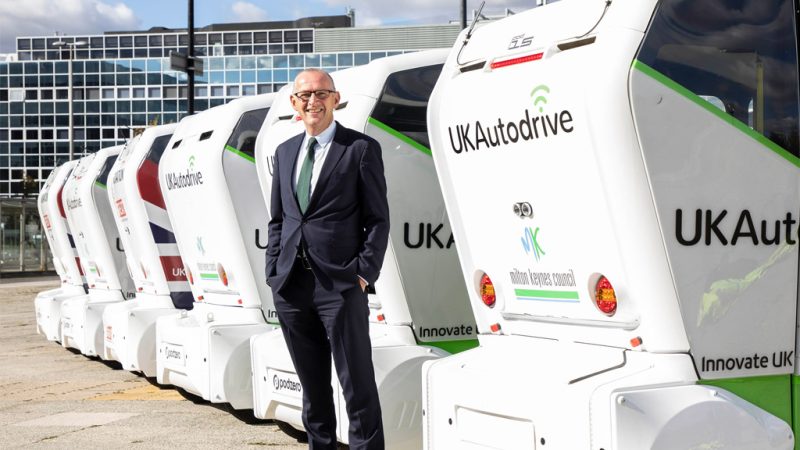The future of transport is moving toward automation, and the UK has positioned itself as a leader in this global shift. One of the most important initiatives driving this transformation was UK Autodrive, a government-backed project dedicated to testing and developing autonomous vehicles (AVs) and connected vehicle technologies.
UK Autodrive ran large-scale trials in real-world environments, bringing together automakers, technology providers, and local councils to make self-driving cars a reality on British roads.
What Is UK Autodrive?
UK Autodrive was a three-year government-supported project (2015–2018) designed to:
- Develop and test autonomous vehicle technologies.
- Explore connected car systems that improve road safety and efficiency.
- Test vehicles in both controlled environments and public roads.
It was part of the UK government’s £100 million Intelligent Mobility Fund, aimed at making Britain a global hub for driverless technology.
Project Partners in UK Autodrive
The project brought together a consortium of 15 partners from different industries:
- Automotive Companies: Jaguar Land Rover, Ford, Tata Motors.
- Technology Providers: RDM Group, HORIBA MIRA, Transport Systems Catapult.
- Academic Institutions: Cambridge University, Oxford University.
- Local Authorities: Milton Keynes and Coventry city councils.
This public-private collaboration was crucial for ensuring both technological development and community integration.
Goals of the UK Autodrive Project
- Test Autonomous Vehicles in Real Environments
Conduct trials in Milton Keynes and Coventry.
Explore how AVs interact with pedestrians, cyclists, and human-driven cars.
- Develop Connected Vehicle Technology
Vehicle-to-vehicle (V2V) communication.
Vehicle-to-infrastructure (V2I) systems.
- Increase Public Awareness and Trust
Allow the public to experience autonomous shuttles and pods.
Educate people about safety and convenience.
- Strengthen the UK’s Role in Mobility Innovation
Position Britain as a world leader in driverless technology.
UK Autodrive Trials
Milton Keynes Trials
- Showcased self-driving pods transporting passengers in pedestrian areas.
- Demonstrated how AVs could support “last-mile” transport solutions.
Coventry Trials
- Tested autonomous cars on public roads.
- Explored interaction between AVs and urban traffic systems.
Vehicle Communication Trials
- Ford vehicles tested emergency braking alerts, traffic signal recognition, and hazard warnings.
Achievements of UK Autodrive
- Successfully ran over 80 demonstrations with autonomous pods.
- Showed how V2V and V2I technology could reduce accidents and congestion.
- Helped shape UK policy and regulations for driverless cars.
- Strengthened public confidence by allowing passengers to ride in AVs.
By 2018, the project concluded with strong evidence that connected and autonomous vehicles (CAVs) could play a major role in Britain’s transport future.
Why UK Autodrive Matters
- Safety → AVs reduce human error, which causes most road accidents.
- Efficiency → Connected cars improve traffic flow and reduce congestion.
- Accessibility → Self-driving shuttles offer mobility to elderly and disabled passengers.
- Sustainability → Many AVs in trials were electric, lowering emissions.
UK Autodrive’s Legacy
Though UK Autodrive officially ended in 2018, it paved the way for:
- Ongoing AV projects like ServCity, Capri, and Auto-Shuttles.
- Regulatory frameworks for self-driving car deployment.
- Investment in autonomous tech hubs across the UK.
Today, the UK continues to build on Autodrive’s momentum, aiming for commercial use of autonomous vehicles by 2030.
Conclusion
The UK Autodrive project was a landmark initiative in Britain’s journey toward autonomous vehicles. By uniting industry leaders, local councils, and universities, it demonstrated how driverless technology and connected systems could transform transport.
From self-driving pods in Milton Keynes to connected cars in Coventry, UK Autodrive proved that autonomous mobility is both possible and beneficial. While the project has ended, its legacy continues to shape the future of transport in the UK and beyond.
FAQs
1. What was the UK Autodrive project?
It was a government-backed initiative (2015–2018) to test autonomous and connected vehicle technology in the UK.
2. Where were UK Autodrive trials conducted?
Mainly in Milton Keynes and Coventry, using pods, cars, and connected vehicles.
3. Who were the partners in UK Autodrive?
Automakers like Jaguar Land Rover and Ford, tech firms, universities, and local councils.
4. What were the outcomes of the project?
It proved the viability of AVs, advanced connected car technology, and influenced UK transport policy.
5. Is the UK still working on autonomous vehicle projects?
Yes, newer projects like ServCity and Capri continue the work started by UK Autodrive.
Also read: Cup Small: A Complete Guide to Compact Cups for Everyday Use









